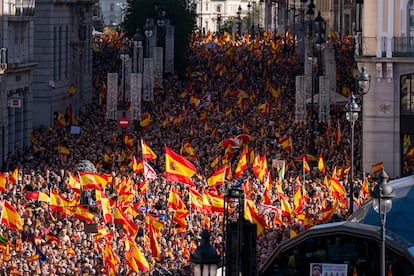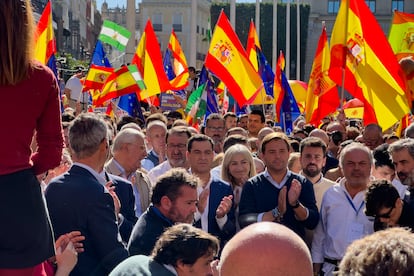Hundreds of thousands of Spaniards march against amnesty for Catalan separatists
In the opposition’s largest show of force to date against the deal granting leniency to Carles Puigdemont and others, there were calls for new elections and general strike

Hundreds of thousands of people filled the streets of 52 provincial capitals of Spain on Sunday, heeding the call of the main opposition party to protest an amnesty deal between the governing Socialists (PSOE) and Catalan separatists who led the failed secession attempt of 2017.
The protests were peaceful, unlike those seen last week at PSOE headquarters in Madrid, where small far-right groups faced off with riot police. People waved Spanish flags, and there were shouts of “Sánchez, dictator!”, “We want to vote!” and “Freedom!” Some people called for new elections and a general strike.
The largest concentration took place in Madrid’s Puerta del Sol, where an estimated 80,000 protesters according to government officials filled the square and the side streets to capacity. Also in attendance were former prime minister José María Aznar (1996-2004), Madrid regional premier Isabel Díaz Ayuso and Madrid mayor José Luis Martínez-Almeida, all from the conservative Popular Party (PP).
“We will not remain silent until we speak in elections and we can all vote again. Because what is being done now is the opposite of what we voted for,” said Alberto Núñez Feijóo, head of the PP, addressing the crowds. “They are afraid of the polls. We Spaniards have the right to give our opinion.”
Feijóo was the winner of the national election held on July 23, but he failed to secure enough of a majority to form a government, paving the way for Prime Minister Pedro Sánchez, of the Socialist Party (PSOE), to attempt to form a new cabinet of his own. The controversy stems from the fact that to do so, he needs seven votes from lawmakers for Junts, the Catalan separatist party whose leader, Carles Puigdemont, led the 2017 breakaway bid, then fled to Belgium to avoid being tried. Spain’s justice system has since been attempting to get him extradited to face charges, and Sánchez said in the past that there would never be an amnesty. Conservatives are portraying the deal as Sánchez selling out to hang on to power, while Socialists describe it as a way to move forward with the thorny problem of Catalan separatist sentiment.
The Sunday protests took place right before Congress is scheduled to hold the investiture session, in which Sánchez expects to secure the 179 votes he needs for an absolute majority with support from Sumar, a broad left-wing alliance, from Catalan separatist parties, from the Basque Nationalist Party (PNV) and others. Voting against will be the PP, the far-right Vox and the conservative regional UPN party of Navarre. Vox’s leader, Santiago Abascal, was part of the crowd in Madrid on Sunday, although he did not give any speeches.
Elsewhere in Spain, the protests focused on criticizing the caretaker government and on slamming Puigdemont, with people waving Spanish flags and banners with slogans such as “Spain is not for sale.” In the southern city of Seville, Andalusian regional premier Juan Manuel Moreno addressed around 50,000 people: “We are not going to be silent, we are not going to kneel, we are going to stand up in defense of freedom and the separation of powers. From the south of Spain we are going to fight the judicial, institutional, political battle in each and every corner of Andalusia.” In the eastern city of Valencia, where another estimated 50,000 people showed up, regional premier Carlos Mazón told the crowd that Sánchez’s “challenge to democracy” requires “a reaction” and warned “those who look the other way” that “they will in future regret being complicit through their passivity.”
All the demonstrations across Spain began with officials reading out a common manifesto, “In defense of the equality of all Spaniards.” The concepts of “equality” and “freedom” have been used liberally by PP leaders as part of their opposition to the amnesty deal. “We want democracy, we want justice and we want dignity. Nothing like this has ever been seen in any Western democracy,” said Feijóo in Madrid, comparing the deal with a property sale operation.
But the PP leader stopped short of stating that Sánchez is trying to implement a “dictatorship,” as Madrid regional leader Díaz Ayuso said repeatedly. “His project is totalitarianism. He has decided that he is not going to lose power, no matter what the cost to Spain. This path will lead us to a dictatorship if there is no counterweight in power. He has decided to become the executive, legislative and the judicial power,” claimed Ayuso.
Feijóo declined to respond to Sánchez after the acting prime minister publicly asked the PP on Saturday to accept the results of the July election and to show some “sanity and moderation” after a week of protests marked by violent episodes in front of PSOE headquarters in Madrid.

Although leaders of the ultranationalist Vox deliberately kept a low profile on Sunday, its leader made some statements prior to the demonstration, to the effect that Sánchez is not in a moral position to talk about respecting the laws of democracy.
“It is tremendous that the prime minister who is carrying out a coup d’état now asks for restraint and [respect for] legitimacy. He came to power by lying and now again. The previous government was illegitimate and so is this one,” said Abascal, alluding to the fact that Sánchez first came to power in 2018 on the back of a successful no-confidence vote against then-PM Mariano Rajoy of the PP.
Sign up for our weekly newsletter to get more English-language news coverage from EL PAÍS USA Edition
Tu suscripción se está usando en otro dispositivo
¿Quieres añadir otro usuario a tu suscripción?
Si continúas leyendo en este dispositivo, no se podrá leer en el otro.
FlechaTu suscripción se está usando en otro dispositivo y solo puedes acceder a EL PAÍS desde un dispositivo a la vez.
Si quieres compartir tu cuenta, cambia tu suscripción a la modalidad Premium, así podrás añadir otro usuario. Cada uno accederá con su propia cuenta de email, lo que os permitirá personalizar vuestra experiencia en EL PAÍS.
¿Tienes una suscripción de empresa? Accede aquí para contratar más cuentas.
En el caso de no saber quién está usando tu cuenta, te recomendamos cambiar tu contraseña aquí.
Si decides continuar compartiendo tu cuenta, este mensaje se mostrará en tu dispositivo y en el de la otra persona que está usando tu cuenta de forma indefinida, afectando a tu experiencia de lectura. Puedes consultar aquí los términos y condiciones de la suscripción digital.








































